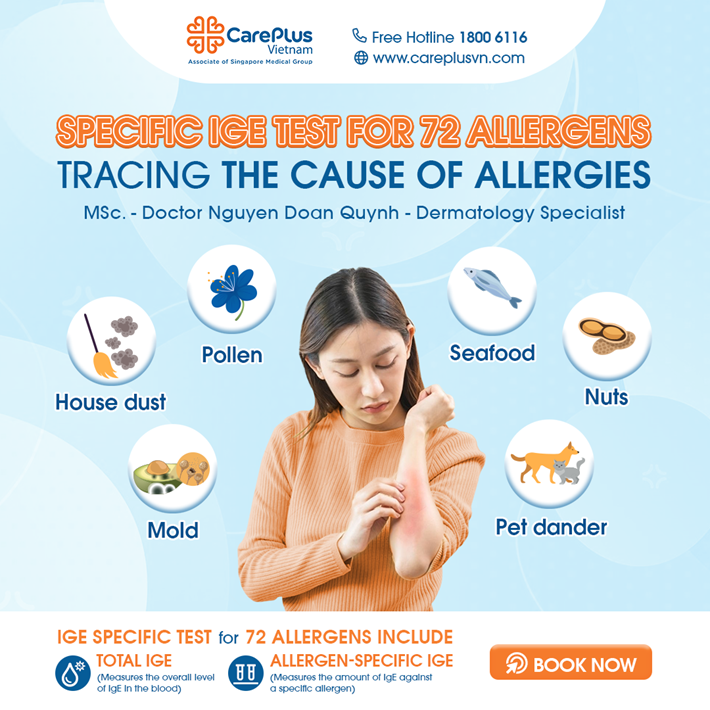Specific IgE Test for 72 Allergens – Tracing the Cause of Allergies
Depending on the type of allergy, the body can exhibit various symptoms. For IgE-mediated allergies, symptoms can range from mild, such as itching and sneezing, to severe, like asthma or even life-threatening anaphylactic shock.

9/17/2024 9:48:51 AM
Allergy is an overreaction of the immune system to harmless substances. When your immune system mistakenly identifies these substances as threats and produces IgE antibodies to "fight" them, your body manifests allergic symptoms.
Harmless substances that can trigger an allergic reaction are called allergens. Common allergens include:
- Pollen
- House dust
- Mold
- Pet dander
- Certain foods like nuts and seafood
What are the common signs of an allergy?
Depending on the type of allergy, the body can exhibit various symptoms. For IgE-mediated allergies, symptoms can range from mild, such as itching and sneezing, to severe, like asthma or even life-threatening anaphylactic shock. Common symptoms of IgE-related allergies include:
- Nasal congestion or runny nose
- Continuous sneezing
- Itchy, watery eyes
- Hives
- Diarrhea or vomiting
- Difficulty breathing, coughing, or wheezing
- Low blood pressure
What is the IgE Specific Test for 72 Allergens?
This test measures the amount of immunoglobulin E (IgE) antibodies in your blood. If you have an allergy, the IgE level in your blood is typically higher than normal.
The test may be ordered to help diagnose allergies or to monitor the condition using the information provided by the test results.
What does the IgE Specific Test for 72 Allergens include?
- Total IgE: Measures the overall level of IgE in the blood.
- Allergen-specific IgE: Measures the amount of IgE against a specific allergen.
This test screens for 72 common allergens.
What do the test results indicate?
- High total IgE: You may have an allergy, but it's unclear what specific substance you're allergic to.
- High allergen-specific IgE: You may be allergic to that specific substance.
If the result is positive, your doctor may refer you to an allergy specialist or recommend appropriate treatments.
Are there any notes regarding allergen testing?
In some cases, you may have a high specific IgE level for a particular substance but show no symptoms when exposed to or ingesting that substance. This is known as a false positive. Therefore, interpreting IgE-specific test results must be done by a doctor, considering your allergy history and clinical symptoms.
Rarely, a blood test may show no allergy when you have one (known as a false negative).
The specific IgE blood test is not the only test to determine whether you have an allergy. If needed, additional tests (like skin allergy tests) or other procedures may be ordered.
What is the testing process?
A healthcare professional will draw blood from a vein in your arm. You may feel a slight sting when the needle is inserted. The procedure takes a few minutes.
Is any preparation needed?
You don't need to fast or do any special preparation before this test.
If the person being tested is a child, parents should explain the procedure and its importance beforehand. You can also stay with your child during the blood draw to provide comfort.
Are there any risks?
You may experience mild pain or bruising where the needle was inserted.
List of the 72 allergens tested:**
|
Allergen |
Allergen |
|
Total IgE / IgE toàn phần |
Tuna/ Salmon / Cá ngừ |
|
House dust / Bụi nhà |
Plaice/ Anchovy/ |
|
Mạt nhà D. pteronyssinus |
Lobster/ Pacific squid / Tôm hùm / Mực Thái Bình Dương |
|
Mạt nhà D. farinae |
Eel / Lươn |
|
Cat epithelium & dander / Biểu mô và lông mèo |
Blue mussel/ Oyster/ |
|
Dog dander / Lông chó |
Silkworm pupa / Nhộng tằm |
|
Egg white / Lòng trắng trứng |
Pork / Thịt heo |
|
Milk / Sữa bò |
Beef / Thịt bò |
|
Cockroach / Gián |
Chicken / Thịt gà |
|
Peanut / Đậu phộng |
Lamb meat / Thịt cừu |
|
Soy bean / Đậu Hà Lan |
Cheese, cheddar type / Phô mai |
|
Wheat / Lúa mì |
Barley / Lúa mạch |
|
Alder / Gỗ trăn |
Rice / Gạo |
|
Birch / Gỗ phong vàng |
Buckwheat / Kiều mạch |
|
Oak / Gỗ sồi |
Yeast, baker’s / Nấm men bánh mì |
|
Common ragweed / Cỏ phấn hương |
Corn / Bắp |
|
Japanese hop / Hoa bia Nhật Bản |
Carrot / Cà rốt |
|
Mugwort / Cây ngải cứu |
Potato / Khoai tây |
|
Nấm Alternaria alternata |
Garlic/ Onion / Tỏi, hành tây |
|
Nấm Cladosporium herbarum |
Celery / Cần tây |
|
Nấm Aspergillus fumigatus |
Cucumber / Dưa chuột |
|
Crab / Cua |
Tomato / Cà chua |
|
Shrimp / Tôm |
Citrus mix / Cam, chanh |
|
Mackerel / Cá thu |
Strawberry / Dâu tây |
|
Cultivated rye / Lúa mạch đen |
Kiwi/ Mango/ Banana / Kiwi, xoài, chuối |
|
CCD / Dị nguyên phản ứng chéo |
Sweet chestnut / Quả dẻ thơm |
|
Peach / Đào |
Walnut / Quả óc chó |
|
Apple / Táo |
Hazel nut / Hạt phỉ |
|
Sesame / Hạt mè (vừng) |
Almond/Pine nut/ |
|
Codfish / Cá tuyết đen (cá mè) |
Cacao / Ca cao |